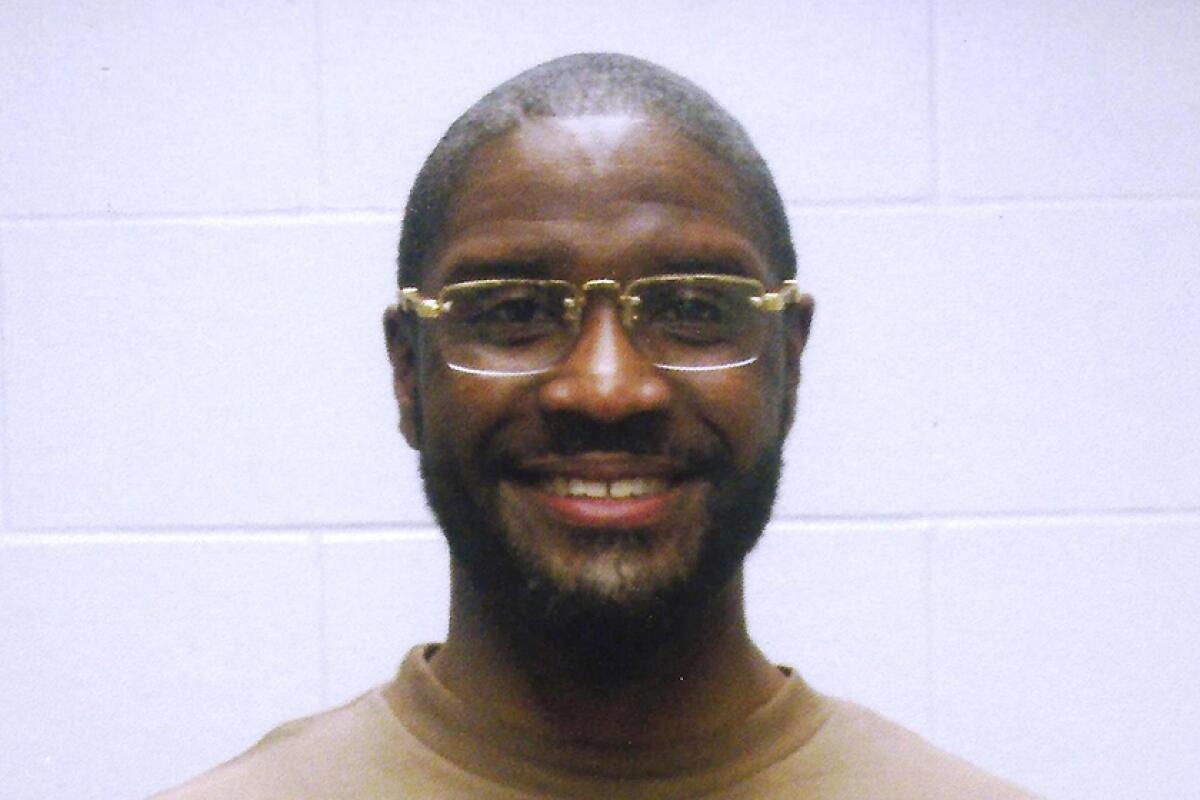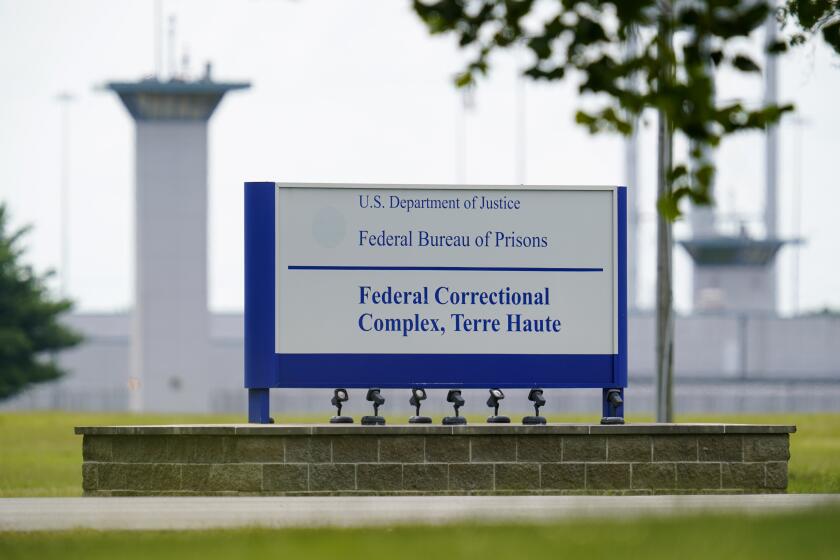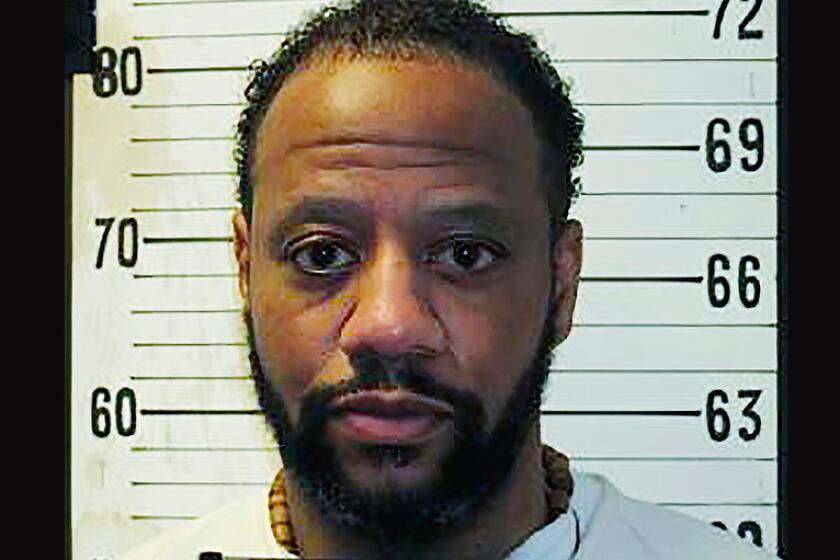U.S. carries out rare execution during presidential transition

- Share via
The Trump administration on Thursday carried out its ninth federal execution of the year and the first during a presidential lame-duck period in 130 years, putting to death a Texas street-gang member for his role in the slayings of a religious couple from Iowa more than two decades ago.
Four more federal executions, including one Friday, are planned in the weeks before President-elect Joe Biden’s inauguration.
The case of Brandon Bernard, who received a lethal injection of phenobarbital inside a death chamber at a U.S. prison in Terre Haute, Ind., was a rare execution of a person who was in his teens when his crime was committed.
Several high-profile figures, including reality TV star Kim Kardashian West, had appealed to President Trump to commute Bernard’s sentence to life in prison.
With witnesses looking on from behind a glass barrier, the 40-year-old Bernard was pronounced dead at 9:27 p.m. Eastern time.
The Justice Department is amending its execution protocols, easing a requirement that federal death sentences be conducted by lethal injection.
Bernard directed his last words to the family of the slain couple, speaking with striking calm for someone who knew he was about to die. “I’m sorry,” he said, lifting his head and looking at the witness-room windows. “That’s the only words that I can say that completely capture how I feel now and how I felt that day.”
Speaking for more than three minutes, Bernard said he had been waiting for this chance to say he was sorry — not only to the victims’ family but also for the pain he caused his own family. Earlier, he said about his role in the killing, “I wish I could take it all back, but I can’t.”
Bernard was 18 when he and four other teenagers abducted and robbed Todd and Stacie Bagley on their way from a Sunday service in Killeen, Texas. Federal executions were resumed by Trump in July after a 17-year hiatus.
Alfred Bourgeois, a 56-year-old Louisiana truck driver, is set to die Friday for killing his 2-year-old daughter by repeatedly slamming her head into a truck’s windows and dashboard. Bourgeois’ lawyers alleged he was intellectually disabled and therefore ineligible for the death penalty, but several courts said evidence didn’t support that claim.
Before Bernard’s execution, Kardashian West tweeted that she’d spoken to him earlier: “Hardest call I’ve ever had. Brandon, selfless as always, was focused on his family and making sure they are ok. He told me not to cry because our fight isn’t over.”
And just before the execution was scheduled, Bernard’s lawyers filed papers with the Supreme Court seeking to halt the execution. The legal team expanded to include two very high-profile attorneys: Alan Dershowitz, the retired Harvard law professor who was part of Trump’s impeachment defense team and whose clients have included O.J. Simpson, Claus von Bulow and Mike Tyson; and Ken Starr, who also defended Trump during the impeachment and is most famous as an independent counsel who led the investigation into Bill Clinton.
But about 2½ hours after the execution was scheduled, the Supreme Court denied the request, clearing the way for the execution to proceed.
Bernard had been crocheting in prison and launched a death-row crocheting group in which inmates have shared patterns for making sweaters, blankets and hats, said Ashley Kincaid Eve, an anti-death-penalty activist.
The Trump administration is rushing to kill a slew of federal prisoners before Joe Biden takes over.
Eve forwarded to the Associated Press Bernard’s latest communication with her on Wednesday, in which he wrote, “I feel good today!” Eve, who is an Indianapolis lawyer but has not represented Bernard, said Bernard was not as resigned to dying as others executed this year have been.
“He desperately wants to live,” she said.
Federal executions during a presidential transfer of power are rare, especially during a transition from a death-penalty proponent to a president-elect like Biden opposed to capital punishment. The last time executions occurred in a lame-duck period was during the presidency of Grover Cleveland in the 1890s.
Defense attorneys have argued in court and in a petition for clemency from Trump that Bernard was a low-ranking, subservient member of the gang. They say both Bagleys were probably dead before Bernard doused their car with lighter fluid and set it on fire, a claim that conflicts with government testimony at trial. Bernard, they say, has repeatedly expressed remorse.
“I can’t imagine how they feel about losing their family,” Bernard said about surviving Bagley relatives in a 2016 video statement from death row. “I wish that we could all go back and change it.” He also described taking part in youth outreach programs and embracing religion, saying, “I have tried to be a better person since that day.”
The case prompted calls for Trump to intervene, including from one prosecutor at his 2000 trial who now says racial bias may have influenced the nearly all-white jury’s imposition of a death sentence against Bernard, who is Black. Several jurors have also since said publicly that they regret not opting for life in prison instead.
Kardashian West said in a series of recent tweets that Bernard’s “role was minor compared to that of the other teens involved.”
The report traces a line from historical lynchings to current executions, showing how Black inmates have been overrepresented on death row.
The Justice Department refused to delay Thursday’s execution of Bernard, another inmate Friday and three more in January, even after eight officials who participated in an execution last month tested positive for the coronavirus. The eight federal executions in 2020 already are more than in the previous 56 years combined.
One of Bernard’s co-defendants, Christopher Vialva, was executed in September. Todd Bagley’s mother, Georgia, released a statement after that execution, saying, “I believe when someone deliberately takes the life of another, they suffer the consequences for their actions.”
Prosecutors said Vialva, the oldest of the teens at 19, was the ringleader who shot the Bagleys, as they lay in the trunk before Bernard set the car on fire.
The teenagers approached the Bagleys in the afternoon of June 21, 1999, and asked them for a lift after they stopped at a convenience store — planning all along to rob the couple. After the Bagleys agreed, Vialva pulled a gun and forced them into the trunk.
The Bagleys, both of whom were in their 20s, spoke through an opening in the back seat and urged their kidnappers to accept Jesus as they drove around for hours trying to use the Bagleys’ ATM cards. After the teens pulled to the side of the road, Vialva walked to the back and shot the Bagleys in the head.
The central question in the decision to sentence Bernard to death was whether Vialva’s gunshots or the fire set by Bernard killed the Bagleys.
Trial evidence showed Todd Bagley probably died instantly. But a government expert said Stacie Bagley had soot in her airway, indicating smoke inhalation and not the gunshot killed her. Defense attorneys have said that assertion wasn’t proven. They’ve also said that Bernard believed both Bagleys were dead and that he feared the consequences of refusing the order of the higher-ranking Vialva to burn the car to destroy evidence.
The first series of federal executions over the summer were of white men, which critics said seemed calculated to make them less controversial amid protests over racial discrimination. Four of the five inmates set to die before Biden’s Jan. 20 inauguration are Black men. The fifth is a white woman who would be the first female inmate executed by the federal government in nearly six decades.
Angel Moore, the federal prosecutor who had recently sought a life term for Bernard, said recent research shows that people tend to view Black defendants as more to blame than their white counterparts when the facts surrounding a crime are the same, and that jurors are less likely to give young Black men benefits of the doubt because of their immaturity.
One juror whose 2016 written statement was included in the White House petition said that he still believes Bernard is responsible for “horrible decisions that had horrendous outcomes” but that “I do not believe that Brandon should be executed for bad choices he made when he was 18.”
Bernard’s 16-year-old daughter had said her father constantly warned her to stay away from the wrong crowds and told her how a single bad decision can ruin your life.
She added, “I am hoping and asking the president to spare my dad’s life.”
More to Read
Sign up for Essential California
The most important California stories and recommendations in your inbox every morning.
You may occasionally receive promotional content from the Los Angeles Times.












